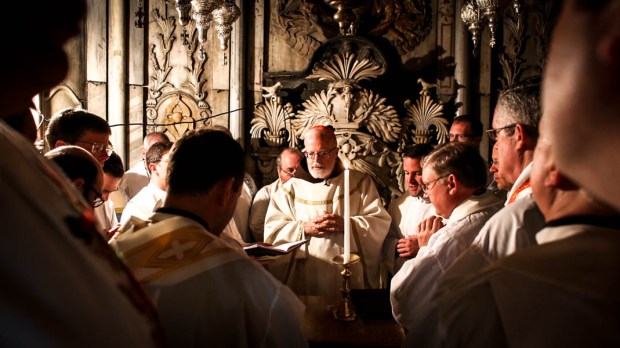“What is time?” That was the wrong question for a 3-year-old to ask a father who had worked for NASA and who hung a gigantic periodic table over his children’s bunk bed. A measured, careful explanation followed of time being a thing that moved forward but that could still change in space and movement. Puzzled, the terms were tucked away for future exploration.
Some years later, we began attending a church built around 1100. The most fascinating aspect was the baptismal font which had not been spared the ravages of Cromwell’s men. The stone apostles still stood at the base, but their heads had been chiseled off. It fascinated me. Running my fingers over those gnarled marks I marveled at being able to touch time – touch something that had been made so many hundreds of years earlier. The smooth folds of the cloaks vs the jagged edges of the severed tops – it provided a physical connection to those eras. I still wondered – “Just what exactly is time?”
In college, the answers of the Physics professor on time were simple, and yet completely unsatisfying. In the Theology department we discussed Kant, Descartes and Leibnitz — the debate descending into whether we even existed, never mind understanding Time. But one day, in passing a rehearsal, the words of the conductor drifted out. “Breathe! You must suspend time!” I slipped inside to listen, and time truly stood still as the choir filled the high, echoing halls of the ancient university.
At the synagogue, searching for Truth, the deep, sonorous chant of the men opened an entirely new dimension of space. “Barukh ata Adonai Eloheinu …” As I probed the faithful, eager to understand this ancient faith, one young man explained that time was simply a mechanism for us to understand where we are in space. That said, however, the Shabbat is a day of complete rest, and time stands still on the sabbath. God rests, and so does time. “This is why,” continued the young man, “one can forget time in the synagogue, one can just be here and forget that there is time. There is no time when one is with God.”
There is no time when one is with God.
A year later, on a bitterly cold Christmas in the north of England, at a Benedictine Cistercian convent, the Father who had come to say Mass spoke about these still, cold convent walls as a place of refuge. A place where there was no rushing around, where one could leave the world for a while and get lost in the True Presence. “Time ceases, and all that matters is that you are in His presence.” He pointed out how, at Mass, the only thing that matters is remembering that Christ is with us, fully present in the Eucharist. We genuflect deeply. We never rush the words. The priest pauses at the Elevation. We all pause. There is no time. The organ would not play as it was so cold, so a sister played the hymns on a violin. When the sweet notes ended, the priest just stood at the altar for a moment, and once again, asked us all to lose ourselves in Christ.
In the United States, for many years, we attended Anglican services. They were said with the greatest reverence. The music was glorious and took you out of this world to a dimension almost hard to describe. But there was Something missing. An old priest gently helped me understand the emptiness and we came into the Church. But at the very first Mass, I wept bitterly. Between the irreverence at the altar, the chatting, the appalling music, what disturbed the most was the rush. Quickly, quickly, let’s get this over with! The hymns ended abruptly, the psalm shortened, the moment the music ended the priest jumped in without even a second delay. Here, Time was more important than God. I just wept.
Eventually, we came to a beautiful church where love for the Mass prevails, where one can get lost in the Adoration Chapel, and where the music reminds you how close the heavenly spheres are. Last Sunday, I had to attend a local Mass that my children have nicknamed the Fast-Food Mass. The music is played at top speeds, the homilies are very short. On that day, the priest took just one minute longer than usual to convey his message. But the moment he ended, the lady in front of me leaned forward and complained, “He always takes too long!” She flew out of the pew before the final hymn had even commenced.
St. Therese of Lisieux wrote, “Jesus, because He is Eternal, regards not the time but only the love.”
Time remains a mystery to me. But one thing has become clear – the absence of time is when in the presence of God, at a Mass said with reverence, when those notes of the Ave Maria wash down over the congregation. Then, there is no time at all. Perhaps that 3-year-old, when asking what Time was, just really wanted to know what timeless Love was.

